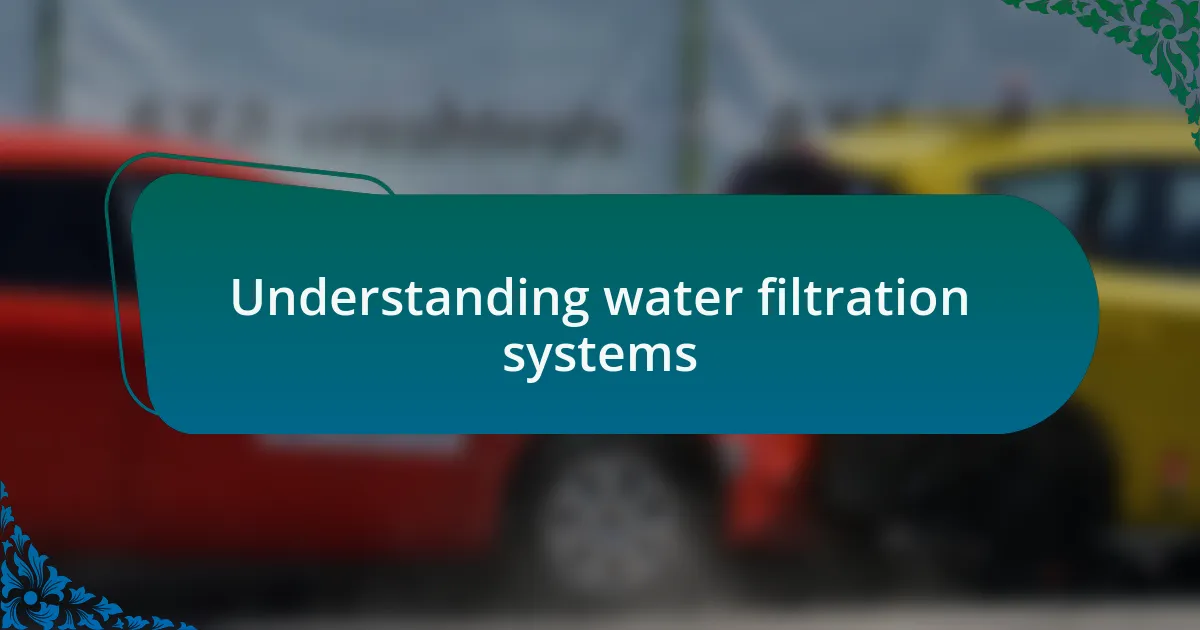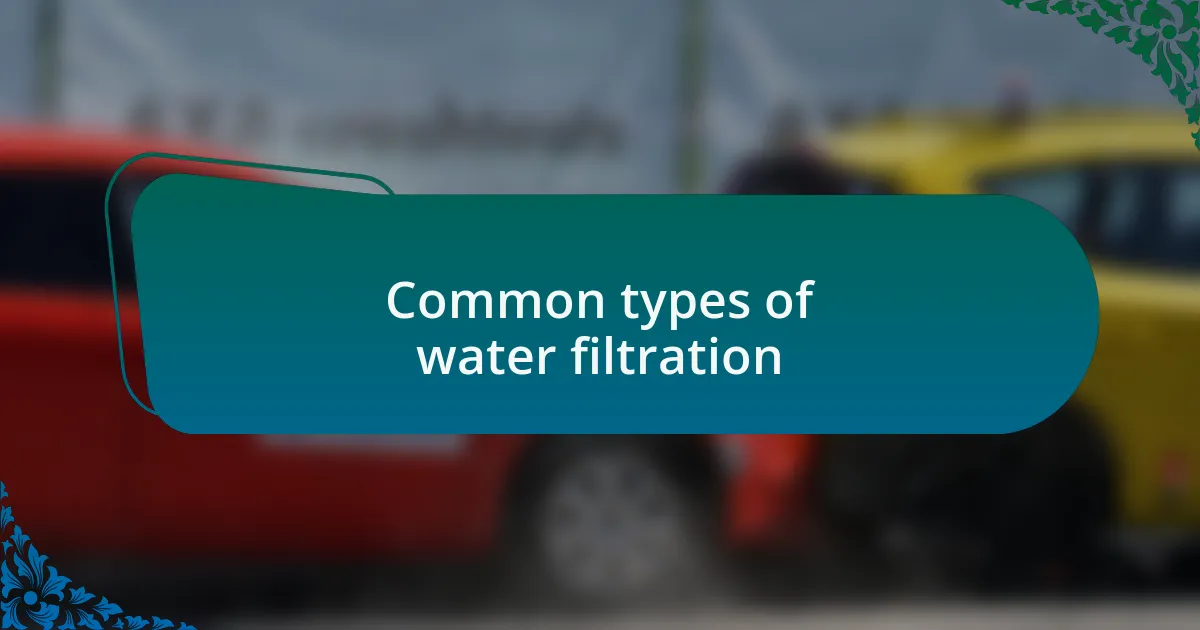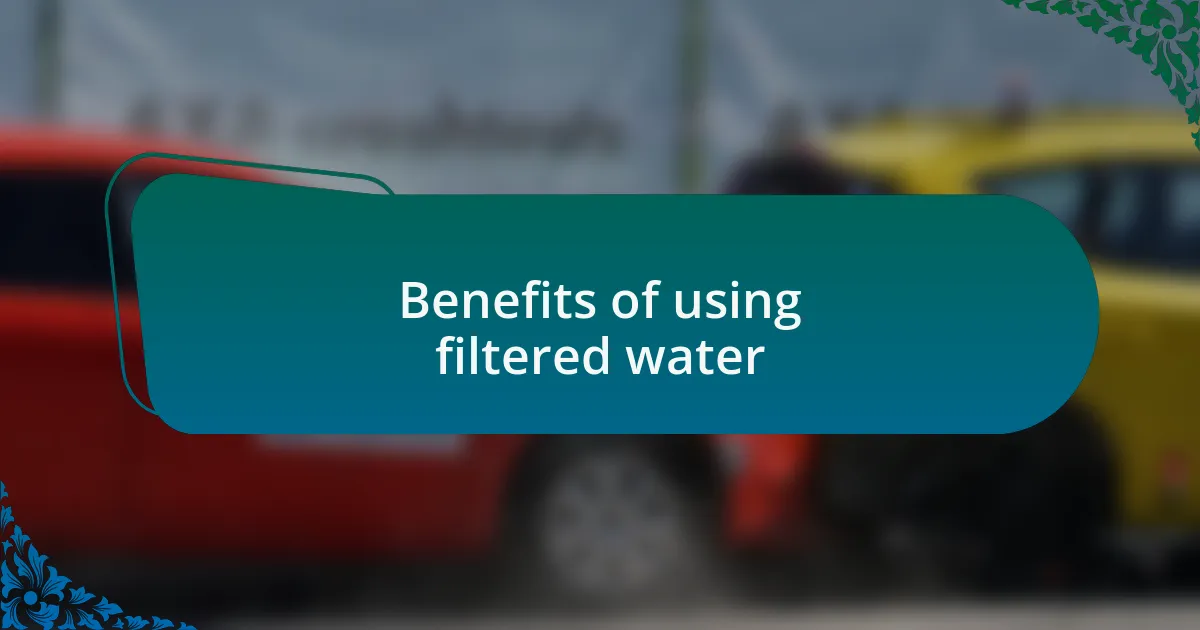Key takeaways:
- Water filtration systems are essential for ensuring clean, safe water for various uses, including car washes, which can enhance cleaning effectiveness and protect vehicle surfaces.
- Common filtration methods include activated carbon filters, reverse osmosis, and UV filtration, each addressing water quality in unique ways.
- Using filtered water in car washes not only improves the cleaning process but also saves money by reducing the need for harsh chemicals.
- Regular maintenance of filtration systems and investing in quality filters can significantly impact water cleanliness and washing efficiency.

Understanding water filtration systems
Water filtration systems are fascinating because they serve a fundamental purpose: they ensure that we have clean, safe water for various uses. When I first learned about the different types of filtration methods, I remember being surprised that something as simple as a filter could remove contaminants and improve water quality so effectively. Have you ever opened your tap and wondered what might be lurking in the water? It’s a common concern, and understanding filtration systems is key to peace of mind.
There are several types of filtration methods, such as activated carbon filters, reverse osmosis systems, and UV filtration. I once visited a car wash that used a reverse osmosis system, and I was intrigued by how it removed impurities and ensured that the rinse water was spotless. It made me realize that not only does a good filtration system keep our water clean, but it also enhances the quality of the cleaning process, leading to a better finish on our vehicles.
I often find myself reflecting on how water quality impacts our lives, not just in washing cars but in everything we consume. For instance, I’ve noticed that my clothes seem fresher after washing thanks to the filtration system in my home. What if your car could benefit from the same thoughtful approach to water use? Understanding these systems can transform everyday routines into something more eco-friendly and effective.

Common types of water filtration
One common type of water filtration that I’ve encountered is the activated carbon filter. I remember installing one in my kitchen and being impressed by how it reduced chlorine taste and odor almost instantly. Have you ever taken a sip of water and actually tasted the difference? It’s like a light switch turning on; the clarity and freshness become remarkably apparent.
Another method that stands out is reverse osmosis. When I saw it in action at a local car wash, I was fascinated by the technology behind it. The way it forces water through a semipermeable membrane to eliminate contaminants makes it a powerhouse for ensuring pure water. Have you ever noticed how much shinier your car looks after a wash with such clean water? It’s not just about cleanliness; it’s also about preserving the finish and protecting your investment.
Lastly, UV filtration systems pique my interest because they take a different approach by using ultraviolet light to kill bacteria and viruses. I recall a conversation with a friend who insisted on using UV filters for his fish tank, swearing by their efficiency. This made me wonder about the broader applications for car washes—could a UV system enhance the quality of water used during the rinse cycle? In my opinion, exploring these innovative systems can lead to a more sustainable and high-quality cleaning process, not only for our cars but also for our environment.

Benefits of using filtered water
Using filtered water in car washes brings a host of benefits that can significantly enhance the cleaning experience. I remember the first time I noticed how much smoother the wash process was after switching to filtered water. The dirt just seemed to lift off effortlessly, and I couldn’t help but marvel at how clean my car looked. Have you experienced that sensation of satisfaction when you see a flawless shine?
One striking advantage of filtered water is its role in protecting car surfaces. I once had a vehicle that suffered from water spots due to hard water, and I learned the hard way about the importance of using filtered water. When I switched, those pesky spots became a thing of the past. Isn’t it reassuring to know that filtered water not only cleans but also preserves the integrity of your car’s paint job?
Additionally, using filtered water can lead to significant savings in the long run. During my visits to various car washes, I noticed that those utilizing filtered systems had less need for harsh chemicals. This not only contributed to a greener operation but also meant my dollars were going further. How many times have you wished for a more efficient wash that’s also eco-friendly? Switching to filtered water checks both boxes.

My experience with water filtration
My experience with water filtration has been quite eye-opening. The first time I watched my car being washed with filtered water, I was struck by the clarity and efficiency with which the dirt vanished. It felt like a refreshing shower for my vehicle, and I couldn’t help but think about how something as simple as water purity could make such a profound difference.
I clearly remember finding white, chalky spots on my windshield after too many washes with hard water. It was frustrating to see my car marred by what I thought was just a routine cleaning. After making the switch to filtered water, I noticed not only a sparkling finish but also a comforting sense of protection for my vehicle. Could something so fundamental as the quality of water change my whole car care approach?
Beyond the immediate visual appeal, I’ve found that filtered water saves me money in the long run. I recall discussing with other car wash owners about reducing the use of chemical cleaners. Their enthusiasm for saving money while providing a superior wash was contagious. Have you considered how much easier it could be to maintain that showroom shine without breaking the bank? Embracing filtered water helped me see the long-term benefits, both for my wallet and for the environment.

Tips for effective water filtration
When it comes to water filtration, I’ve learned that regular maintenance is key. I used to overlook my filtration system, assuming it was working fine. However, during one wash, I noticed the output was noticeably less crisp. After checking, I discovered that my filters were clogged. It was a rude awakening that reinforced the importance of periodic checks.
Additionally, I’ve found that investing in the right type of filtration system pays off. At first, I opted for a basic setup, but after extensive discussions with other car wash enthusiasts, I stepped up to a reverse osmosis system. The difference was remarkable. My vehicles not only appeared cleaner, but the finish also lasted longer. Have you ever wondered how much more effective your wash could be with a better system?
Another tip worth mentioning is to consider water temperature. Through my own experience, I’ve realized that warmer water, combined with filtration, helps in achieving a more thorough cleaning. Initially, I thought it was just a gimmick, but once I tried it, I felt the difference in the wash quality. Don’t you think it makes sense to optimize every aspect of the car washing process to treat your vehicle right?